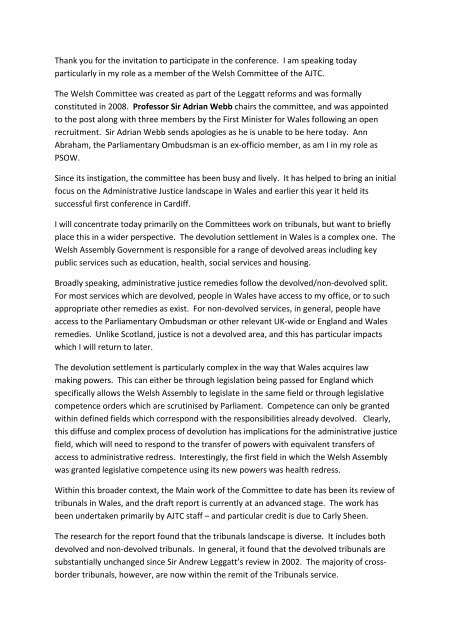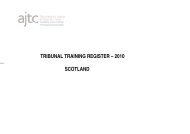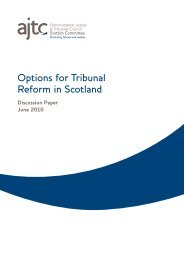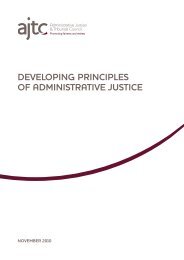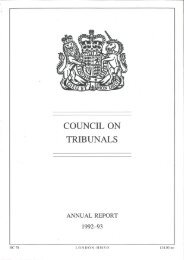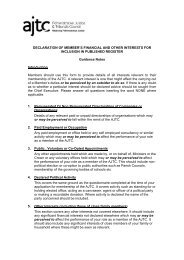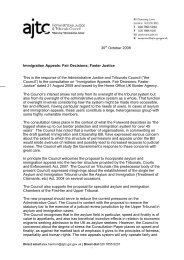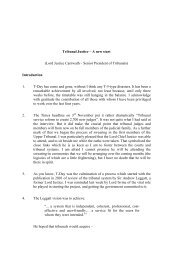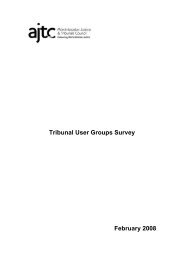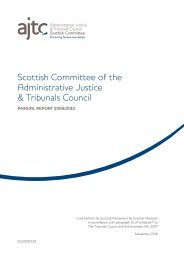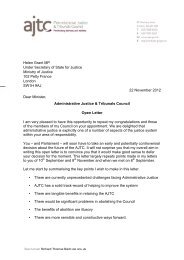Thank you for the invitation to participate in the conference
Thank you for the invitation to participate in the conference
Thank you for the invitation to participate in the conference
Create successful ePaper yourself
Turn your PDF publications into a flip-book with our unique Google optimized e-Paper software.
<strong>Thank</strong> <strong>you</strong> <strong>for</strong> <strong>the</strong> <strong><strong>in</strong>vitation</strong> <strong>to</strong> <strong>participate</strong> <strong>in</strong> <strong>the</strong> <strong>conference</strong>. I am speak<strong>in</strong>g <strong>to</strong>day<br />
particularly <strong>in</strong> my role as a member of <strong>the</strong> Welsh Committee of <strong>the</strong> AJTC.<br />
The Welsh Committee was created as part of <strong>the</strong> Leggatt re<strong>for</strong>ms and was <strong>for</strong>mally<br />
constituted <strong>in</strong> 2008. Professor Sir Adrian Webb chairs <strong>the</strong> committee, and was appo<strong>in</strong>ted<br />
<strong>to</strong> <strong>the</strong> post along with three members by <strong>the</strong> First M<strong>in</strong>ister <strong>for</strong> Wales follow<strong>in</strong>g an open<br />
recruitment. Sir Adrian Webb sends apologies as he is unable <strong>to</strong> be here <strong>to</strong>day. Ann<br />
Abraham, <strong>the</strong> Parliamentary Ombudsman is an ex-officio member, as am I <strong>in</strong> my role as<br />
PSOW.<br />
S<strong>in</strong>ce its <strong>in</strong>stigation, <strong>the</strong> committee has been busy and lively. It has helped <strong>to</strong> br<strong>in</strong>g an <strong>in</strong>itial<br />
focus on <strong>the</strong> Adm<strong>in</strong>istrative Justice landscape <strong>in</strong> Wales and earlier this year it held its<br />
successful first <strong>conference</strong> <strong>in</strong> Cardiff.<br />
I will concentrate <strong>to</strong>day primarily on <strong>the</strong> Committees work on tribunals, but want <strong>to</strong> briefly<br />
place this <strong>in</strong> a wider perspective. The devolution settlement <strong>in</strong> Wales is a complex one. The<br />
Welsh Assembly Government is responsible <strong>for</strong> a range of devolved areas <strong>in</strong>clud<strong>in</strong>g key<br />
public services such as education, health, social services and hous<strong>in</strong>g.<br />
Broadly speak<strong>in</strong>g, adm<strong>in</strong>istrative justice remedies follow <strong>the</strong> devolved/non-devolved split.<br />
For most services which are devolved, people <strong>in</strong> Wales have access <strong>to</strong> my office, or <strong>to</strong> such<br />
appropriate o<strong>the</strong>r remedies as exist. For non-devolved services, <strong>in</strong> general, people have<br />
access <strong>to</strong> <strong>the</strong> Parliamentary Ombudsman or o<strong>the</strong>r relevant UK-wide or England and Wales<br />
remedies. Unlike Scotland, justice is not a devolved area, and this has particular impacts<br />
which I will return <strong>to</strong> later.<br />
The devolution settlement is particularly complex <strong>in</strong> <strong>the</strong> way that Wales acquires law<br />
mak<strong>in</strong>g powers. This can ei<strong>the</strong>r be through legislation be<strong>in</strong>g passed <strong>for</strong> England which<br />
specifically allows <strong>the</strong> Welsh Assembly <strong>to</strong> legislate <strong>in</strong> <strong>the</strong> same field or through legislative<br />
competence orders which are scrut<strong>in</strong>ised by Parliament. Competence can only be granted<br />
with<strong>in</strong> def<strong>in</strong>ed fields which correspond with <strong>the</strong> responsibilities already devolved. Clearly,<br />
this diffuse and complex process of devolution has implications <strong>for</strong> <strong>the</strong> adm<strong>in</strong>istrative justice<br />
field, which will need <strong>to</strong> respond <strong>to</strong> <strong>the</strong> transfer of powers with equivalent transfers of<br />
access <strong>to</strong> adm<strong>in</strong>istrative redress. Interest<strong>in</strong>gly, <strong>the</strong> first field <strong>in</strong> which <strong>the</strong> Welsh Assembly<br />
was granted legislative competence us<strong>in</strong>g its new powers was health redress.<br />
With<strong>in</strong> this broader context, <strong>the</strong> Ma<strong>in</strong> work of <strong>the</strong> Committee <strong>to</strong> date has been its review of<br />
tribunals <strong>in</strong> Wales, and <strong>the</strong> draft report is currently at an advanced stage. The work has<br />
been undertaken primarily by AJTC staff – and particular credit is due <strong>to</strong> Carly Sheen.<br />
The research <strong>for</strong> <strong>the</strong> report found that <strong>the</strong> tribunals landscape is diverse. It <strong>in</strong>cludes both<br />
devolved and non-devolved tribunals. In general, it found that <strong>the</strong> devolved tribunals are<br />
substantially unchanged s<strong>in</strong>ce Sir Andrew Leggatt’s review <strong>in</strong> 2002. The majority of crossborder<br />
tribunals, however, are now with<strong>in</strong> <strong>the</strong> remit of <strong>the</strong> Tribunals service.
As <strong>the</strong> arrangements are similar <strong>to</strong> elsewhere <strong>in</strong> <strong>the</strong> UK I don’t <strong>in</strong>tend <strong>to</strong> dwell on <strong>the</strong>m<br />
here. However, it is important <strong>to</strong> note that jo<strong>in</strong>t upper tribunal and adm<strong>in</strong>istrative court<br />
facilities have been established <strong>in</strong> Cardiff and venues <strong>for</strong> tribunals have been identified<br />
around Wales. The service is also provided bil<strong>in</strong>gually. It is also helpful <strong>to</strong> note <strong>in</strong> pass<strong>in</strong>g<br />
that <strong>the</strong> adm<strong>in</strong>istrative court has made considerable endeavours <strong>to</strong> secure access <strong>for</strong> people<br />
<strong>in</strong> Wales and <strong>in</strong> both pr<strong>in</strong>cipal languages.<br />
A small number of cross border tribunals rema<strong>in</strong> outside <strong>the</strong> Tribunal Service, and <strong>the</strong>re are<br />
issues which could usefully be addressed.<br />
The Welsh Assembly Government decided that devolved tribunals would not jo<strong>in</strong> <strong>the</strong><br />
Tribunals Service nor would <strong>the</strong>y <strong>for</strong>m part of <strong>the</strong> unified structure. The Committee’s survey<br />
of <strong>the</strong> Welsh tribunals reveals a fragmented system which has developed <strong>in</strong> an ad hoc<br />
fashion.<br />
The devolved tribunals are diverse and <strong>in</strong>clude those convened by <strong>the</strong> Adjudication Panel<br />
<strong>for</strong> Wales which consider cases where it is alleged that members of local authorities <strong>in</strong><br />
Wales have breached <strong>the</strong>ir Code of Conduct, Independent Review of Determ<strong>in</strong>ation Panels<br />
consider<strong>in</strong>g decisions on adoptions, <strong>in</strong>dependents social services compla<strong>in</strong>ts panels, school<br />
admission and exclusions panels, <strong>the</strong> mental health review tribunal <strong>for</strong> Wales, <strong>the</strong> Special<br />
educational needs tribunal <strong>for</strong> Wales, and land and valuation tribunals amongst o<strong>the</strong>rs. In<br />
<strong>the</strong> Committees regular work of review<strong>in</strong>g <strong>the</strong> tribunals, it is evident that <strong>the</strong>re is a broad<br />
spread of practice and quality, and this was reflected <strong>in</strong> <strong>the</strong> results of <strong>the</strong> survey undertaken<br />
by <strong>the</strong> Committee. The means of appo<strong>in</strong>t<strong>in</strong>g members, <strong>the</strong> process <strong>for</strong> tra<strong>in</strong><strong>in</strong>g and<br />
assess<strong>in</strong>g member per<strong>for</strong>mance, remuneration, access <strong>to</strong> advisers, procedural matters,<br />
support arrangement and leadership all vary greatly. In some <strong>in</strong>stances, <strong>the</strong> variation is<br />
clearly an appropriate response <strong>to</strong> <strong>the</strong> work of particular tribunals and <strong>the</strong> needs of <strong>the</strong>ir<br />
users. In o<strong>the</strong>rs, it appears <strong>to</strong> be largely a product of his<strong>to</strong>rical accident.<br />
Appeal routes also vary from none at all <strong>to</strong> judicial review. Some of <strong>the</strong> tribunals are with<strong>in</strong><br />
my jurisdiction, and <strong>in</strong> some <strong>in</strong>stances, I can consider <strong>the</strong> orig<strong>in</strong>al matter, as is <strong>the</strong> case with<br />
social service <strong>in</strong>dependent reviews, whereas <strong>in</strong> o<strong>the</strong>rs my role is conf<strong>in</strong>ed <strong>to</strong> adm<strong>in</strong>istrative<br />
matters. In some cases, appeals can be made <strong>to</strong> <strong>the</strong> Upper Tier Tribunal.<br />
One of <strong>the</strong> key f<strong>in</strong>d<strong>in</strong>gs relates <strong>to</strong> <strong>in</strong>dependence. Many of <strong>the</strong> tribunals are appo<strong>in</strong>ted and<br />
supported by <strong>the</strong> bodies responsible <strong>for</strong> <strong>the</strong> services from which cases arise. The need <strong>to</strong><br />
address this not surpris<strong>in</strong>gly underp<strong>in</strong>s some of <strong>the</strong> emerg<strong>in</strong>g recommendations.<br />
The Committee has set out a number of pr<strong>in</strong>ciples which it believes should underp<strong>in</strong> <strong>the</strong><br />
re<strong>for</strong>m of tribunals <strong>in</strong> Wales. These draw on earlier work <strong>in</strong>clud<strong>in</strong>g that of <strong>the</strong> <strong>for</strong>mer<br />
Council on Tribunals.
The pr<strong>in</strong>ciples are<br />
• Independence and impartiality<br />
• Accessibility <strong>to</strong> users<br />
• Efficiency and effectiveness, and<br />
• Coherence.<br />
The recommendations which are emerg<strong>in</strong>g are premised on <strong>the</strong> assumption that <strong>the</strong>re<br />
needs <strong>to</strong> be a rational and comprehensive approach <strong>to</strong> adm<strong>in</strong>istrative justice <strong>in</strong> Wales <strong>in</strong><br />
place of <strong>the</strong> ad-hoc and piecemeal system which has developed over time.<br />
There is a clear need <strong>for</strong> democratic scrut<strong>in</strong>y which is most appropriately provided by <strong>the</strong><br />
National Assembly <strong>for</strong> Wales. It will be a matter <strong>for</strong> <strong>the</strong> Assembly <strong>to</strong> determ<strong>in</strong>e how best <strong>to</strong><br />
achieve this with<strong>in</strong> <strong>the</strong> constra<strong>in</strong>ts of its committee structure.<br />
The Assembly Government needs <strong>to</strong> create a focal po<strong>in</strong>t <strong>for</strong> adm<strong>in</strong>istrative justice <strong>in</strong> Wales.<br />
Because justice has not been devolved, <strong>the</strong>re is no natural locus <strong>for</strong> this <strong>in</strong> <strong>the</strong> shape of a<br />
justice m<strong>in</strong>istry. The Committee is <strong>the</strong>re<strong>for</strong>e likely <strong>to</strong> suggest that this locus could be<br />
created with<strong>in</strong> <strong>the</strong> First M<strong>in</strong>ister’s department, as this does not have direct responsibility <strong>for</strong><br />
service delivery.<br />
It is also expected <strong>to</strong> recommend that policy and responsibility <strong>for</strong> tribunals should transfer<br />
here, away from service provid<strong>in</strong>g departments.<br />
In addition, it believes that all tribunal members should be recruited us<strong>in</strong>g open, fair and<br />
transparent processes based on merit, and that appo<strong>in</strong>tments should be made by Welsh<br />
M<strong>in</strong>isters, or by <strong>the</strong> Lord Chancellor as appropriate.<br />
The relative scale of tribunals <strong>in</strong> Wales does not provide a persuasive case <strong>for</strong> a<br />
thoroughgo<strong>in</strong>g rationalisation along <strong>the</strong> UK model. However, <strong>the</strong> Committee has identified<br />
potential mergers and amalgamations which would tackle some of <strong>the</strong> exist<strong>in</strong>g<br />
<strong>in</strong>efficiencies.<br />
The Committee has also identified a need <strong>for</strong> best practice <strong>to</strong> be shared between tribunals<br />
and will recommend a specific role <strong>for</strong> judicial leaders <strong>in</strong> this regard.<br />
On <strong>the</strong> issue of accessibility, <strong>the</strong> committee has identified particular shortfalls <strong>in</strong> access <strong>to</strong><br />
<strong>in</strong><strong>for</strong>mation and has believes that <strong>the</strong>re is a case <strong>for</strong> a review designed <strong>to</strong> identify best<br />
practice and <strong>to</strong> raise standards across <strong>the</strong> board <strong>to</strong> reflect this.<br />
The Committee has also identified a need <strong>for</strong> improvements <strong>to</strong> tribunal procedures, which<br />
seeks <strong>to</strong> ensure that procedures are nei<strong>the</strong>r so <strong>for</strong>mal nor so costly as <strong>to</strong> create an<br />
<strong>in</strong>equality of arms between government agencies and tribunal users.
The survey identified considerable variation <strong>in</strong> <strong>the</strong> advice and advocacy available <strong>to</strong> tribunal<br />
users. In some <strong>in</strong>stances, <strong>the</strong> arrangements were evidently appropriate <strong>to</strong> <strong>the</strong> needs of<br />
tribunal users and <strong>the</strong> issues under consideration. In o<strong>the</strong>rs, <strong>the</strong> support available was not<br />
of an appropriate standard and work will be required <strong>to</strong> achieve consistently high standards.<br />
Standards of engagement with tribunal users also varied considerably, with some hav<strong>in</strong>g<br />
well considered structures <strong>for</strong> receiv<strong>in</strong>g on-go<strong>in</strong>g feedback while o<strong>the</strong>rs have no <strong>for</strong>mal<br />
arrangements whatsoever. Once aga<strong>in</strong>, <strong>the</strong> Committee believes that all tribunals should be<br />
reach<strong>in</strong>g <strong>the</strong> standards of <strong>the</strong> best.<br />
The Committee looked at Tribunal’s compla<strong>in</strong>ts policies and concluded that <strong>the</strong>re should be<br />
a standard approach adopted by all. This is consistent with o<strong>the</strong>r work I am lead<strong>in</strong>g <strong>to</strong><br />
develop a common approach <strong>to</strong> manag<strong>in</strong>g compla<strong>in</strong>ts across <strong>the</strong> devolved public sec<strong>to</strong>r <strong>in</strong><br />
Wales.<br />
The Committee has also considered <strong>the</strong> advantages of work<strong>in</strong>g with <strong>the</strong> Welsh Language<br />
Board <strong>to</strong> produce a standard Welsh language scheme <strong>to</strong> be adopted by all tribunals.<br />
The Committee has been aware of considerable variation <strong>in</strong> practice concern<strong>in</strong>g hear<strong>in</strong>g<br />
venues, and at its worst, creat<strong>in</strong>g barriers of access and perceptions of bias. I have <strong>to</strong> say<br />
that this issue has also been reflected <strong>in</strong> compla<strong>in</strong>ts <strong>to</strong> my office. The Committee wants <strong>to</strong><br />
see a standard policy on venues, based on <strong>the</strong> needs of users.<br />
The survey revealed that <strong>the</strong>re is <strong>in</strong>consistency <strong>in</strong> <strong>the</strong> way <strong>in</strong> which per<strong>for</strong>mance<br />
management data is collected and published by tribunals <strong>in</strong> Wales. Not all, <strong>for</strong> example,<br />
issue annual reports and some report on a calendar year basis while o<strong>the</strong>rs use <strong>the</strong> f<strong>in</strong>ancial<br />
year. The Committee wants <strong>to</strong> see consistent report<strong>in</strong>g standards and regular reports from<br />
all.<br />
The diffuse arrangements <strong>for</strong> support<strong>in</strong>g tribunals <strong>in</strong>evitably raise questions about <strong>the</strong><br />
efficiency with which resources are deployed and a focus on value <strong>for</strong> money is one which<br />
will need <strong>to</strong> be adopted by as part of any new rationalised arrangements.<br />
The issue of judicial quality is a hugely significant one. A raft of issues needs <strong>to</strong> be<br />
addressed <strong>in</strong>clud<strong>in</strong>g determ<strong>in</strong><strong>in</strong>g appropriate numbers of members <strong>for</strong> panels <strong>to</strong> ensure<br />
that each member has sufficient opportunities <strong>to</strong> sit <strong>in</strong> order <strong>to</strong> ma<strong>in</strong>ta<strong>in</strong> skill levels, a<br />
consistent approach <strong>to</strong> tra<strong>in</strong><strong>in</strong>g and development with budgets sufficient <strong>to</strong> support this<br />
across all tribunals and proper appraisal mechanisms <strong>for</strong> all leaders and members which<br />
<strong>in</strong><strong>for</strong>m <strong>the</strong> development of tra<strong>in</strong><strong>in</strong>g programmes.<br />
The Committee has also been persuaded of <strong>the</strong> case <strong>for</strong> guidel<strong>in</strong>es <strong>to</strong> be put <strong>in</strong> place by <strong>the</strong><br />
Welsh Assembly Government on <strong>the</strong> establishment of new tribunals.<br />
There is a major <strong>in</strong>consistency <strong>in</strong> <strong>the</strong> appeal rights from exist<strong>in</strong>g tribunals. Where this<br />
<strong>in</strong>consistency is not justified, <strong>the</strong> Committee will be call<strong>in</strong>g <strong>for</strong> a more consistent approach.
F<strong>in</strong>ally, and of particular importance, is <strong>the</strong> need <strong>to</strong> ensure that <strong>the</strong> lessons from appeal<br />
outcomes are learnt. The Committee is committed <strong>to</strong> seek<strong>in</strong>g improvements <strong>in</strong> orig<strong>in</strong>al<br />
decision mak<strong>in</strong>g which is one of <strong>the</strong> key components of <strong>the</strong> work of ombudsmen but which<br />
is less embedded with<strong>in</strong> <strong>the</strong> work of tribunals. A clear consist support mechanism with<strong>in</strong><br />
<strong>the</strong> Welsh Assembly Government could help <strong>to</strong> promote learn<strong>in</strong>g <strong>in</strong> a way which <strong>the</strong> current<br />
arrangements cannot.<br />
Inevitably, a review of this k<strong>in</strong>d tends <strong>to</strong> highlight areas <strong>for</strong> improvement, and does not fully<br />
reflect some of <strong>the</strong> exist<strong>in</strong>g excellent work be<strong>in</strong>g undertaken by tribunals <strong>in</strong> Wales. The<br />
review has shown that by mak<strong>in</strong>g some straight<strong>for</strong>ward and practical changes it will be<br />
possible <strong>to</strong> build on <strong>the</strong> exist<strong>in</strong>g good practice <strong>to</strong> ensure that devolved tribunals <strong>in</strong> Wales<br />
can offer access <strong>to</strong> adm<strong>in</strong>istrative justice <strong>for</strong> <strong>the</strong> people of Wales of a standard that will<br />
stand comparison with <strong>the</strong> rest of <strong>the</strong> UK and beyond.


